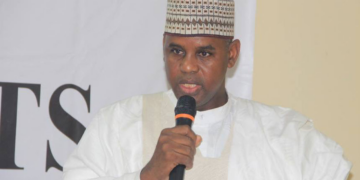Wife of Lagos State Governor Dr Ibijoke Sanwo-Olu has called for the efficient management of the over 2.2 billion cubic metres of untreated domestic wastewater being generated on a daily basis in the state.
She warned of a possible outbreak of epidemic if the situation was not well handled.
Mrs Sanwo-Olu stated this at a three-day workshop organised by the Lagos State Waste Water Regulatory Commission in collaboration with Faecal Sludge Management Alliance, The Netherlands.
Speaking on the theme of the event: “Regulating Urban Sanitation Services – Guidelines and Standards,” she emphasised the need for proper structured and sustainable arrangement to regulate and manage the faecal sludge value chain starting from collection, transportation, treatment and disposal which according to her would yield both economic and environmental benefit to the state.
The governor’s wife maintained that the negative impact of inadequate and improper regulation of faecal sludge management on the health of people in general and children, in particular, is enormous, as the workshop would help to stimulate discussion aimed at facilitating a better understanding of the policy, legal and institutional framework for sanitation and wastewater management in Lagos State.
She said, “As a medical doctor, I am conscious of the fact that all waterborne diseases are deadly. Experts have also established that there is an unbreakable relationship between health and the environment. They are both intertwined!
“Diarrhoea, for instance, is the second largest killer of children below five years in Nigeria, only next to pneumonia. According to the World Health Organisation (W.H.0), 88 percent of diarrhoea cases are attributable to factors essentially originating from poor management of excreta disposal.
The executive secretary of the Lagos State Water Regulatory Commission, Mrs Funke Adepoju, stressed the need for the stakeholders to key into the policy guidelines that would galvanise and up-skill critical sector players in the State in sustainably managing faecal sludge.
Adepoju said the workshop was a necessary beginning for long-term sanitation transition to improve the effectiveness of sanitation transition and ensure a regulatory system for public health.





